– Alice Walker
This module is all about shedding light on who has power, determining how they’re using it, and doing what we can to hold those in power accountable. We will start by asking coaches to examine their own power and asking players to do the same.
One of the things that makes inclusive coaching different from what we may think of as “traditional coaching” is that inclusive coaches embrace the opportunity to give away power. Inclusive coaches admit when they make mistakes, they apologize to their players, and they show vulnerability and authenticity. Where some coaches may not like the lack of power they have during games, inclusive coaches know this is where players can really grow and thrive
This willingness to examine systems of power, to challenge how existing policies either reinforce or work to dismantle historically unjust power systems is how inclusive coaching becomes anti-racist coaching.
In this module, teams will practice identifying unfairness and figuring out how to find and influence power to make change. As changemakers, we have the ability to address injustice in many places beyond the pitch. This is the power we all hold.
We must each recognize the ways in which we have power, and the ways in which we lack power
We are more powerful in groups working collectively than as individuals
We must ensure that people in positions of power are good representatives of those they serve, and are held accountable by transparent systems and advocacy
The Washington Race Equity & Justice Initiative (REJI) Organizational Race Equity Toolkit is designed to help organizations understand and incorporate race equity into their work. For Switch the Pitch coaches, we recommend two specific parts of the toolkit:
